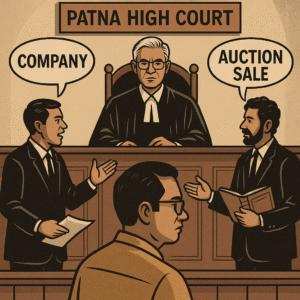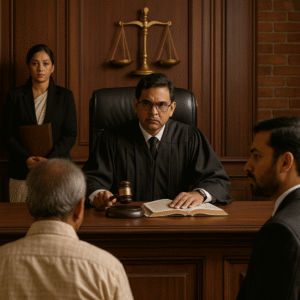The Patna High Court has ruled in favor of the State of Bihar in a significant set of appeals involving the compulsory retirement of several government engineers. The court upheld the State’s decision to retire the officers prematurely under Rule 74 of the Bihar Service Code, reversing earlier judgments of the learned Single Judge that had quashed the retirement orders.
Simplified Explanation of the Judgment
In this case, five government engineers were compulsorily retired through a common order dated 18 June 2020 issued by the Building Construction Department, Government of Bihar. The engineers challenged this action through separate writ petitions, arguing that their retirement was unlawful, stigmatic in nature, and passed without following due procedure, such as issuing a charge memo or show cause notice.
The learned Single Judge of the High Court had allowed these writ petitions, declaring the compulsory retirement orders as arbitrary and beyond the scope of Rule 74. Consequently, the State of Bihar filed five Letters Patent Appeals (LPAs) to challenge these decisions.
The Division Bench, comprising Hon’ble the Chief Justice and Hon’ble Mr. Justice Partha Sarthy, considered all the appeals together. It found that the compulsory retirement was carried out as per Rule 74 of the Bihar Service Code and not in violation of any legal principle.
The judgment noted that a high-level committee, including eleven senior officers from the Building Construction Department, had reviewed the complete service records of the engineers. This committee unanimously concluded that the continued service of the engineers was not in the public interest. Accordingly, the retirement orders were issued along with provisions for post-retirement benefits and three months’ salary in lieu of notice.
The court referred to the Supreme Court’s ruling in Central Industrial Security Force vs. HC (GD) Om Prakash [(2022) 5 SCC 100], which clarified that orders of compulsory retirement under service rules are not punitive in nature and do not require adherence to principles of natural justice like a hearing or show-cause notice.
Moreover, the court emphasized that the scope of judicial review in such cases is limited. Unless the order is proven to be mala fide, arbitrary, or issued without consideration of relevant records, the court should not interfere.
Accordingly, the High Court set aside the earlier orders passed by the Single Judge and dismissed all five writ petitions. The appeals by the State were allowed.
Significance or Implication of the Judgment
This judgment reinforces the authority of the State Government to compulsorily retire public servants in the interest of administrative efficiency and public service. It affirms that compulsory retirement under Rule 74 is not a punishment but a tool to maintain discipline and integrity in government service. The decision also acts as a precedent clarifying that such retirement actions need not be preceded by formal disciplinary proceedings or a hearing, provided the decision is based on objective material.
This is particularly significant for departments handling infrastructure and development, where performance and conduct directly impact public projects. For government employees, it is a reminder that service records and performance evaluations over the entire career are subject to scrutiny and can affect service continuation, even post-promotion.
Legal Issue(s) Decided and the Court’s Decision
- Whether compulsory retirement under Rule 74 of the Bihar Service Code is valid without issuing a show-cause notice or chargesheet?
- Held: Yes. The rule allows for retirement in public interest without treating it as a penalty.
- Whether such retirement orders are stigmatic or punitive?
- Held: No. The court held that the orders were not punitive or stigmatic in nature.
- Whether prior adverse entries lose relevance after promotions?
- Held: No. The court relied on the Supreme Court’s view that entire service records, including old adverse entries, can be considered for premature retirement.
- Whether the writ courts can review such orders on merits?
- Held: Judicial review is limited to assessing whether the decision was arbitrary, mala fide, or unsupported by record.
Judgments Referred by Parties
- Central Industrial Security Force vs. HC (GD) Om Prakash, (2022) 5 SCC 100
Judgments Relied Upon or Cited by Court
- Union of India v. V.P. Seth
- Union of India v. Dulal Dutt
- Rajasthan State Road Transport Corporation v. Babu Lal Jangir
- Pyare Mohan Lal v. State of Jharkhand
- Ram Murti Yadav v. State of Uttar Pradesh, (2020) 1 SCC 801
Case Title
State of Bihar & Ors. vs. Satish Kumar Singh & Ors.
Case Number
LPA No. 1468 of 2023 with LPA Nos. 1450, 1451, 1452, 1453 of 2023
Citation(s)- 2025 (1) PLJR 147
Coram and Names of Judges
Hon’ble the Chief Justice and Hon’ble Mr. Justice Partha Sarthy
Names of Advocates and who they appeared for
- For the Appellants (State of Bihar): Mr. P.K. Shahi, Advocate General; Mrs. Binita Singh, SC 28; Mr. Kumaresh Singh, AC to SC 28; Mr. Nishant Kumar Jha and Mr. Vivek Anand Amritesh, AC to SC 28
- For the Respondents (Writ Petitioners): Mr. Prabhu Nath Pathak, Advocate
Link to Judgment
MyMxNDY4IzIwMjMjMSNO-2kO8jVW1FEg=
If you found this explanation helpful and wish to stay informed about how legal developments may affect your rights in Bihar, you may consider following Samvida Law Associates for more updates.







